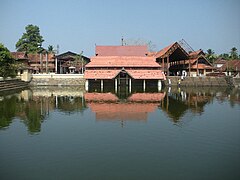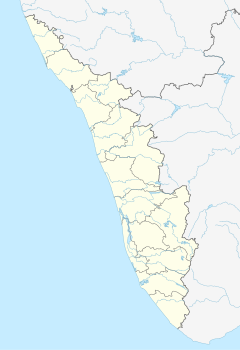Ambalappuzha Sri Krishna temple
| Ambalappuzha Sri Krishna Temple | |
|---|---|

A panoramic view of Ambalappuzha Sri Krishna Temple.
|
|
| Name | |
| Proper name | Ambalapuzha Sri Krishna Temple |
| Malayalam | അമ്പലപ്പുഴ ശ്രീകൃഷ്ണ ക്ഷേത്രം |
| Geography | |
| Coordinates | 9°23′01″N 76°22′10″E / 9.3836°N 76.3695°ECoordinates: 9°23′01″N 76°22′10″E / 9.3836°N 76.3695°E |
| Country |
|
| State | Kerala |
| Location | Ambalappuzha |
| Culture | |
| Primary deity | Lord Krishna |
| History and governance | |
| Date built | AD 790 |
| Creator | Chembakasserry Pooradam Thirunal-Devanarayanan Thampuran |
Ambalappuzha Sri Krishna Temple (Malayalam: അമ്പലപ്പുഴ ശ്രീകൃഷ്ണ ക്ഷേത്രം) is a Hindu temple in Ambalappuzha, Alapuzha district of Kerala, in south India.
The Ambalappuzha Sri Krishna Temple is believed to have been built during 15th – 17th AD by the local ruler Chembakasserry Pooradam Thirunal-Devanarayanan Thampuran.
The idol at Ambalapuzha is likened to Parthasarthi (പാർത്ഥസാരഥി) with a whip in the right hand and a Shankhu (sacred conch) in the left. This temple is directly associated to the Guruvayoor Sree Krishna Temple. During the raids of Tipu Sultan in 1789, the idol of Sri Krishna from the Guruvayoor Temple was brought to the Ambalappuzha Temple for safe keeping. It kept safely for 12years.
The payasam served in the Ambalappuzha Temple is famous among Hindu devotees. This sweet pudding made of rice and milk has an interesting mythological legend behind it.It is believed that Guruvayoorappan reaches here daily at the time of Palpayasa Nedyam to have it.
According to the legend, God Krishna once appeared in the form of a sage in the court of the king who ruled the region and challenged him for a game of chess (or chaturanga). The king being a chess enthusiast himself gladly accepted the invitation. The prize had to be decided before the game and the king asked the sage to choose his prize in case he won. The sage told the king that he had a very modest claim and being a man of few material needs, all he wished was a few grains of rice. The amount of rice itself shall be determined using the chess-board in the following manner. One grain of rice shall be placed in the first square, two grains in the second square, four in the third square, eight in the fourth square, sixteen in 5th square and so on. Every square will have double of its predecessor.
...
Wikipedia

